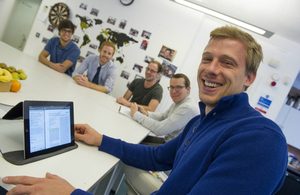Mendeley shares scientific research to build a better future
London based company Mendeley develops an online tool for sharing scientific research papers, with funding support from Innovate UK.

Jan Reichelt is the president and co-founder of Mendeley
Jan Reichelt is the president and co-founder of Mendeley, an online service that allows students and researchers to share scientific research papers and collaborate online.
It is now used by more than three million scientists around the world and over 500 million citations and documents have been added to the website since 2008.
But the academics and researchers who use Mendeley may not have been able to access the platform if it wasn’t for a £254,000 Eureka Eurostars grant funded through Innovate UK.
“Initially, we looked for venture funding,” said Jan.
“Early investors included the people behind Skype, Last.fm and Warner Music Group. But since there was a strong strand of public interest in our aims for Mendeley - bettering society through more efficient research - we thought governments might be interested in supporting us as well.”
A business based on partnership
Jan applied to the Innovate UK Eureka Eurostars programme, which provided vital funding and networking opportunities for his business.
“We knew Innovate UK funding would come with strong academic and business networking potential,” said Jan.
“The Eureka Eurostars programme was a particularly good fit and offered a sustainable funding model for what we wanted to build.”
The combination of public funding and a growing number of user subscriptions meant that Mendeley’s founders could focus on developing the research platform, rather than continually chasing additional venture capital funding to survive.
It also enabled them to build the business quickly. The first 18 months were spent defining and validating the market fit for the product, after which it moved into a full-scale adoption phase.
“We wanted Mendeley to do three things; increase the productivity and efficiency of scientific research, foster collaborative working, and contribute to open science,” said Jan.
These challenges, and breaking down the barriers associated with them, are Mendeley’s main business drivers.
Opening closed doors, sharing knowledge
One of Jan’s key motivations for developing the business is to open up scientific research so that information can be shared more easily between researchers.
“The benefits of knowing what the most-read papers are, the hottest and latest research topics, and what information is being compiled (and reviewed) on a daily basis ought to be available beyond these small circles.
“If we can find a way to aggregate all this anonymous activity and make it available to third-party developers for reuse, the possibilities for open collaboration and research will be greatly increased,” said Jan.
The task of building a sustainable business from a start-up has not been easy for Jan, with delays caused by technology problems, and people leaving jobs to start new ones.
“We want to enjoy the journey with all its ups and downs, and we have a strong vision for the platform, but there are always doubts - for both scientists and entrepreneurs. Will people believe in your vision? Will you continue to grow? Can you commercialise the product you are developing?”
But the hard work paid off.
With support from Innovate UK, the business continued to grow and in 2013 it was acquired by academic publishing company Elsevier.
“I believe every scientist has to be an entrepreneur. Our work is all about exploring new ways of doing things, and making them work,” said Jan.
A more connected future
Mendeley’s future looks bright. The company has been clocking up awards ever since it was founded in 2008.
The company first won the Plugg 2009 European Start-Up of the Year trophy, which was followed in 2010 by being named ‘Start-up Most Likely to Change the World for the Better’ by Guardian Activate.
Mendeley continues to be recognised for its innovation as Jan recently picked up an Innovation Excellence award in 2014 from the Stationers Company.
With its growing network of academic connections, support and funding from Innovate UK, and the enormous resources of Elsevier to call on, Mendeley continues to grow strongly - and has hired over 20 people already this year.
“Our focus for the next 12 months will be to continue to build the most innovative research management tool we can,” said Jan.
“We’re confident that we’re in a great position to make researchers’ lives easier and advance scientific discovery in the process.”
Updates to this page
-
First published.